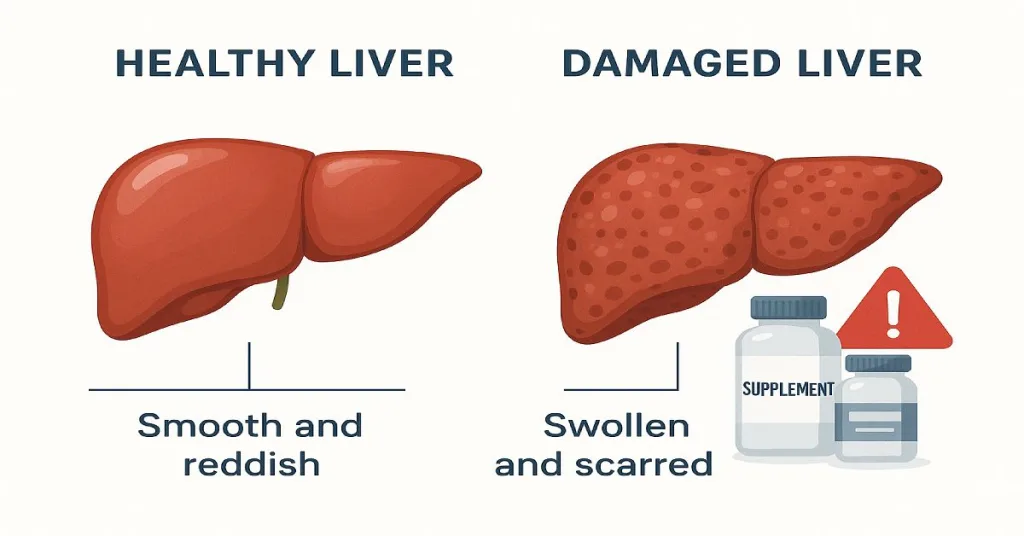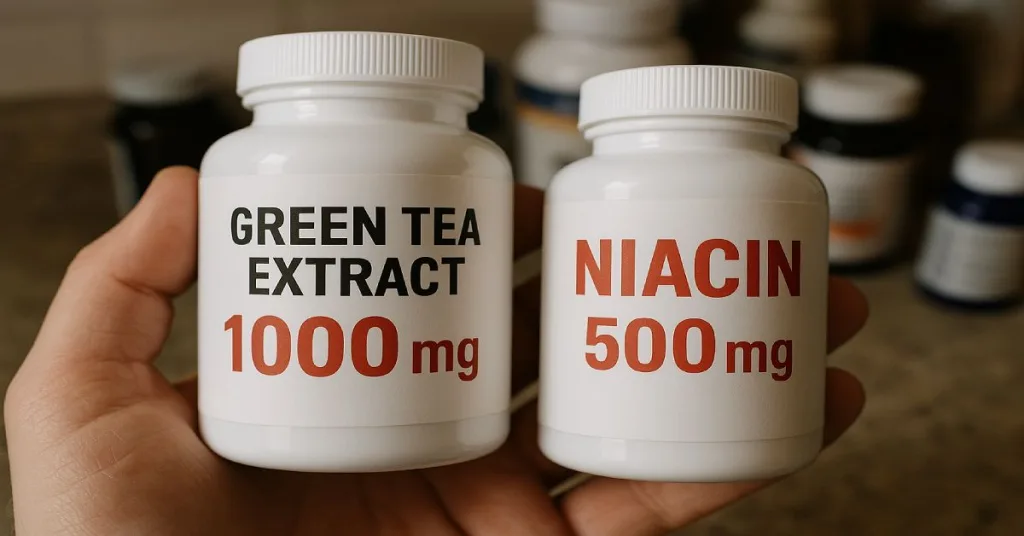It’s easy to assume that supplements are harmless. After all, they’re sold over-the-counter, marketed as “natural,” and wrapped in health promises. But here’s a hard truth: taking too many supplements — or the wrong ones — can absolutely damage your liver.
Your liver is your body’s chemical processing plant. And when you flood it with pills, powders, and extracts day after day — even with the best intentions — things can go south fast.
This post breaks it all down:
- How supplement liver damage happens
- The worst ingredients for your liver
- Early warning signs to catch
- How to spot dangerous formulas
- And which supplements actually help support liver function
This post may contain affiliate links. If you click and purchase, I may earn a small commission at no extra cost to you. I only recommend products I personally use or have thoroughly researched.
What the Liver Does (and Why It Matters for Supplements)
Your liver is the master detox organ. It filters your blood, breaks down toxins, metabolizes nutrients, and helps convert chemicals into safe, usable forms — or eliminate them entirely.
When you take supplements, here’s what your liver has to do:
- Process active ingredients (vitamins, minerals, herbals)
- Break down excesses or unneeded nutrients
- Clear additives, fillers, and synthetic compounds
- Handle potential contaminants or interactions
That’s a lot of work — especially if you’re taking multiple products, doubling up on certain nutrients, or chasing trends with “detox kits” or fat burners.
The Rise of Supplement-Induced Liver Damage
In recent years, liver injury caused by supplements has been on the rise — and it’s now officially recognized by doctors as HILI (Herb-Induced Liver Injury).
According to the NIH’s LiverTox database, up to 20% of drug-induced liver injury cases are now caused by supplements — especially herbal blends, bodybuilding products, and weight-loss pills.
Why? Because:
- Supplements are not FDA-approved or regulated like drugs
- Labels can hide doses using “proprietary blends”
- Many are spiked with unlisted ingredients
- People stack products with overlapping compounds (often unknowingly)
Which Supplements Can Harm the Liver?
Let’s get specific. Here are the top ingredients linked to liver stress or injury — especially when taken in high doses or combined with other risky compounds:
⚠️ Vitamin A (Retinol, Not Beta-Carotene)
- Upper safe limit: 3,000 mcg/day (10,000 IU)
- Liver risk: Fibrosis, cirrhosis from long-term high dosing
- Hidden in: Cod liver oil, multivitamins, eye health blends
⚠️ Niacin (Vitamin B3)
- Liver risk: Elevated liver enzymes, hepatitis, even failure at high sustained doses
- Threshold to watch: >500 mg/day (especially sustained-release versions)
⚠️ Green Tea Extract (EGCG)
- Risky form: Capsules, not brewed tea
- Mechanism: Concentrated catechins can trigger liver inflammation in sensitive users
- Not uncommon in: Fat burners, detox products
⚠️ Kava
- Banned or restricted in several countries
- Linked to acute liver failure, even at normal doses
- Avoid entirely, especially if you’re taking other supplements
⚠️ Prohormones / “Natural Steroids”
- Found in bodybuilding products
- Known to cause cholestatic liver injury
- Often spiked with actual anabolic steroids
⚠️ High-Dose Iron
- Dangerous if you’re not iron-deficient
- Iron overload → oxidative stress and liver cell damage
- Get tested before supplementing
⚠️ Black Cohosh
- Used for menopause and hormone support
- Linked to liver injury in rare but serious cases

How Liver Damage from Supplements Happens
It’s not always the dose of one product — it’s the total burden from multiple overlapping sources:
- You take a fat burner with green tea extract
- Then a “detox” blend with dandelion, milk thistle, and unknown herbs
- Then a multivitamin that contains niacin and vitamin A
- Then a pre-workout with a proprietary blend of 20+ ingredients
Individually, these might be safe. Together? You’ve got a liver stress bomb.
Early Warning Signs of Liver Trouble
Liver damage can creep in quietly — but there are signs. Don’t ignore these:
🟡 Early symptoms:
- Fatigue or weakness
- Abdominal discomfort (upper-right side)
- Nausea, low appetite
- Dark urine, pale stools
🔴 Serious symptoms (seek immediate help):
- Yellowing skin or eyes (jaundice)
- Severe itching
- Swelling in abdomen or legs
- Mental confusion or brain fog (a sign of liver failure)
If any of these start after introducing a new supplement, stop taking it immediately and call your doctor.
How to Read Supplement Labels for Liver Risk
To protect your liver, become a label detective. Here’s what to look for:
🔍 Red Flags:
- Proprietary blends with no dosage breakdown
- Serving sizes of 4+ capsules per day (huge ingredient load)
- Overlapping ingredients (like 3 products all with green tea or niacin)
- Claims like “detox” or “fat burner” — usually loaded with risky stimulants or herbs
✅ What’s safer:
- Full transparency (no hidden blends)
- Moderate dosages (especially of vitamins A, D, E, iron, niacin)
- 3rd-party tested brands with GMP certifications

🛡️ Supplements That Actually Support Liver Health
Not all supplements harm the liver. In fact, a few are clinically proven to support it — especially in reasonable doses and from reputable sources.
Here are the top liver-supportive ingredients worth considering:
✅ Milk Thistle (Silymarin)
- Most studied liver herb
- Helps repair liver cells, reduce inflammation, and fight oxidative stress
- Dosage: 150–300 mg silymarin 2x/day
- Brand examples: NOW Foods, Life Extension
✅ NAC (N-Acetyl Cysteine)
- Precursor to glutathione — the liver’s master antioxidant
- Used in hospitals to treat acetaminophen overdose
- Dosage: 600–1,200 mg/day
- Brand examples: Life Extension, Jarrow Formulas
✅ Alpha-Lipoic Acid (ALA)
- Regenerates antioxidants like vitamin C and glutathione
- Supports mitochondrial health in liver cells
- Dosage: 300–600 mg/day
✅ Turmeric (Curcumin)
- Anti-inflammatory and antioxidant
- Must include black pepper extract for absorption
- Watch out for high doses mixed with other harsh ingredients
✅ Schisandra Berry
- Traditional adaptogen with hepatoprotective effects
- Less common in Western formulas, but well-regarded in TCM
These are NOT miracle pills — but they can support liver function if your diet and lifestyle are solid.
Tips to Protect Your Liver While Supplementing
Here’s how to use supplements without wrecking your liver:
✔ Get bloodwork before adding iron, vitamin A, etc.
✔ Use fewer, better-quality products — not 10 random ones
✔ Avoid “detox” trends and extreme cleanses
✔ Hydrate — water helps the liver clear toxins
✔ Give your liver a break: take supplement holidays
✔ Track what you’re taking — including dose and brand
Final Thoughts: Respect Your Liver — and Your Labels
Supplements can do amazing things — but only if you’re using them intelligently. Your liver isn’t a trash compactor. You can’t just keep stuffing it with products and expect it to hold up forever.
- Read your labels
- Don’t double-dose ingredients
- Favor liver-safe products
- And if something feels off, stop immediately
You only get one liver. Take care of it like it takes care of you.
see also: N-Acetyl Cysteine (NAC): The Antioxidant That Does More Than You Think